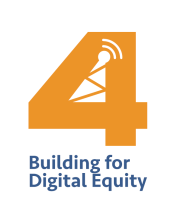Brandon Forestor Puts Local in Local Internet Organizing - Building for Digital Equity Podcast Episode 13

Brandon Forester is the National Organizer for Internet Rights at Media Justice. We talk about organizing for digital equity and more specifically Brandon's vision for communities having agency over how technology shows up in their neighborhoods and digital communities. We discuss how Media Justice came to prioritize prison phone justice, what organizing is and how local solutions may differ in different communities, and the need to avoid purity politics in doing this work.
This show is 20 minutes long and can be played on this page or using the podcast app of your choice with this feed.
Transcript below.
We want your feedback and suggestions for the show-please e-mail us or leave a comment below.
Listen to other episodes here or see other podcasts from the Institute for Local Self-Reliance here.
Thanks to Joseph McDade for the music. The song is On the Verge and is used per his Free-Use terms.


